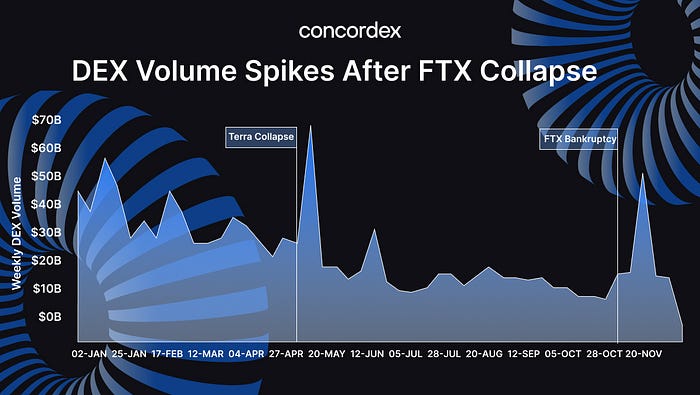Why DEX Is Safer: Lessons from FTX and Mt. Gox

In the ever-evolving landscape of cryptocurrency trading, the choice between centralised exchanges and decentralised exchanges remains a constant consideration for traders worldwide. Each option offers its own set of advantages and drawbacks, catering to different preferences and priorities. However, when it comes to safety and security, one crucial distinction sets DEX apart from CEX.
The recent history of high-profile breaches, exemplified by collapses such as those involving FTX and Mt. Gox, underscores the vulnerability of CEX. As we delve deeper into the safety considerations, let’s discover why DEX is a safer option.
What Is CEX and DEX?
Nowadays, two types of exchanges dominate the landscape: Centralised Exchanges (CEX) and Decentralised Exchanges (DEX). These platforms are pivotal in the trading of digital assets, offering different approaches to security, control, and ease of use.
- Centralised Exchanges, or CEXs, are the traditional players in the crypto market. They act as third-party intermediaries that facilitate the trading of cryptocurrencies. Users of CEXs trust the platform to manage their assets, which means that the exchange holds the cryptocurrencies and executes trades. This setup is similar to traditional banking systems and stock exchanges, offering a familiar interface for users, alongside benefits such as customer support and advanced trading features.
- Decentralised Exchanges, known as DEXs, represent a shift towards a trustless environment in crypto trading. They operate without a central authority, allowing users to execute peer-to-peer transactions directly from their wallets. This model enhances security and privacy since users don’t need to transfer their assets to the exchange. However, it also means that DEXs often have a steeper learning curve and may lack some of the advanced features and user support found in CEXs.
5 Reasons Why Dex Is a Safer Option
In most scenarios, the choice between CEX and DEX boils down to personal preference and individual priorities. Here are several advantages of DEXs over CEXs that may not be immediately apparent:
- Enhanced Security: DEXs are widely regarded as more secure than CEXs due to their operation on decentralised networks, reducing susceptibility to hacks and security breaches. Users retain control of their private keys, ensuring continuous ownership and management of their assets.
- Absolute Control Over Assets: Within a DEX, users enjoy complete control over their wallets and private keys, granting them full ownership. However, this also necessitates sole responsibility for safeguarding assets.
- Heightened Privacy: DEXs eliminate the need for users to divulge personal information or identity through Know-Your-Customer (KYC) processes, catering to privacy-conscious individuals. Traders utilising DEXs are not obliged to disclose private keys or identity, as wallets are externally held, and the DEX bears no liability for funds.
- Reduced Market Manipulation: DEX automation, combined with their non-possession of user data, renders these modern exchanges less susceptible to manipulation.
- Transparency and Accountability: Every transaction on a DEX is recorded on an immutable public blockchain, ensuring complete transparency and enabling any user to authenticate transaction legitimacy.
CEX Vulnerabilities: Lessons from FTX and Mt. Gox
Centralised exchanges adhere to a conventional financial model where a singular entity governs the platform, assuming custody of users’ funds and acting as an intermediary for all transactions. Consequently, trading on these platforms does not entail possession of actual cryptocurrency assets; rather, users engage in transactions involving numerical representations within the apps’ databases. While this approach has facilitated the rapid expansion and acceptance of cryptocurrency trading, it also exposes traders to significant risks. In the event of a centralised exchange being compromised through hacking, users’ funds are susceptible to theft or complete loss, offering traders limited avenues for recourse.
- The Mt. Gox breach in 2014 stands as a poignant example of the hazards associated with centralised exchanges. At its peak, Mt. Gox emerged as the largest Bitcoin exchange globally, managing over 70% of all Bitcoin transactions. However, subsequent revelations disclosed that the exchange had fallen victim to a cyber attack, resulting in the disappearance of 850,000 bitcoins, valued at over $450 million at the time. This breach significantly impacted the cryptocurrency market, precipitating a decline in Bitcoin prices and eroding investor confidence in centralised exchanges.
- FTX collapsed in early November 2022 after CoinDesk reported that an affiliated trading firm, Alameda Research, derived most of its value from speculative cryptocurrency tokens. A surge of customer withdrawals, driven by concerns over this questionable financial valuation practice and the unusually close relationship with Alameda, pushed FTX and Alameda into bankruptcy, shaking the volatile crypto market. The market lost billions and fell below a $1 trillion valuation as a result. Subsequently, in December 2022, the U.S. government brought civil and criminal charges against Sam Bankman-Fried and top executives for misappropriating over $8 billion in customer deposits, laying the groundwork for insolvency, and generating false financial statements inflated with niche token holdings to mask the shortfall. This further compounded the fallout from FTX’s collapse, adding to the turmoil in the cryptocurrency market and raising questions about the integrity of centralised exchanges.
Conclusion
In conclusion, the comparison between centralised exchanges (CEX) and decentralised exchanges (DEX) reveals a significant disparity in terms of safety and security. While CEX may offer convenience and familiarity, they remain vulnerable to hacking and security breaches. On the other hand, DEX operates on decentralised networks, prioritising user control and privacy, thus providing a safer trading environment.
About Concordex
Concordex is a cutting-edge Decentralised Exchange (DEX) that operates on the Concordium Blockchain. Renowned for emphasising institutional-grade security, transparency, and user-centric design, Concordex offers various services, including staking, swapping, and perpetual trading. With a mission to bridge the divide between traditional finance and decentralised systems, it offers users an unparalleled trading environment.
